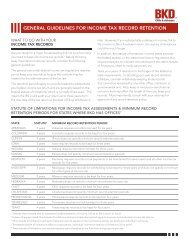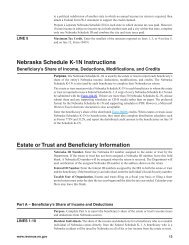acfe fraud prevention check-up - BKD
acfe fraud prevention check-up - BKD
acfe fraud prevention check-up - BKD
- No tags were found...
Create successful ePaper yourself
Turn your PDF publications into a flip-book with our unique Google optimized e-Paper software.
An organization’s HR gro<strong>up</strong> is often responsible for developing and providing the necessary training on thepurpose of the <strong>fraud</strong> risk management program, including the codes of conduct and ethics, what constitutes<strong>fraud</strong>, and what to do when <strong>fraud</strong> is suspected. The effectiveness of this training is dependent on mandatoryattendance with periodic <strong>up</strong>dates and refresher sessions.Evaluating Performance and Compensation ProgramsHR managers should be involved in both the performance management and compensation programs.Performance management involves the evaluation of employee behavior and performance as well as workrelatedcompetence. It is a human trait to want recognition of competence and reward for positive performanceand success. Regular and robust assessment of employee performance with timely and constructive feedbackgoes a long way to preventing potential problems. Employees who are not recognized for what they do andwhat they have accomplished, especially those who may have been bypassed for promotion, may feel theirinappropriate and <strong>fraud</strong>ulent conduct is justified.Reward can also be reflected in compensation. By conducting compensation surveys and local market analysis,HR can determine whether senior management and employees are compensated appropriately and thereforedriving desired behavior by striking a balance between fixed and variable compensation. Managers whosecompensation is largely based on short-term performance-related bonuses may be motivated to cut corners ordeliberately fabricate financial results to achieve those bonuses.Conducting Exit InterviewsA policy of conducting exit interviews of terminated employees or those who have resigned can help in both<strong>prevention</strong> and detection efforts. These interviews may help HR managers determine whether there are issuesregarding management’s integrity or information regarding conditions conducive to <strong>fraud</strong>. HR should alsoreview the content and information contained in resignation letters as they may contain information regardingpossible <strong>fraud</strong> and misconduct existing within the organization.Authority LimitsFraud is less likely when an individual’s level of authority is commensurate with his or her level of responsibility. Amisalignment between authority and responsibility, particularly in the absence of control activities and segregationof duties, can lead to <strong>fraud</strong>.An organization may establish authoritative approval levels across the enterprise to serve as an entity-level control.On the other hand, individuals working within a specific function may be assigned only limited IT access as aprocess-level control. These types of controls, s<strong>up</strong>ported by an appropriate segregation of duties, assist in the firstline of defense in <strong>fraud</strong> <strong>prevention</strong>.Transaction-level ProceduresReviews of third-party and related-party transactions can also help prevent <strong>fraud</strong>. Because <strong>fraud</strong> schemes ofteninvolve the use of third-party entities/individuals, organizations need thorough measures at the front-end that32









